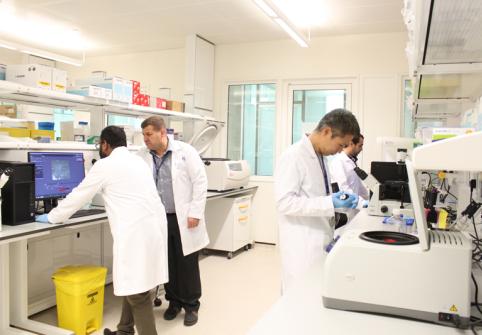News
Tackling one of the World’s Biggest Health Challenges
13 Oct 2018
By Qatar Biomedical Research Institute's Dr. Eyad Elkord, Principal Investigator, and Dr. Hirohito Yamaguchi, Senior Scientist
Cancer is a leading cause of illness and death, and is one of the key health challenges facing humanity today. Breast cancer is the most common cancer, and it is the leading cause of cancer-related deaths in women worldwide. Notably, Arab women may experience a more aggressive form of breast cancer, and overall are diagnosed at an age of 10 years younger than western women.
Although recent advances in early detection and treatment have significantly reduced the rate of deaths caused by breast cancer, a large proportion of patients with metastatic disease (a cancer or disease that has spread from one organ to another part of the body that is not directly connected to the original source of the disease) unfortunately succumb to the disease. Moreover, many breast cancer patients who initially respond to therapy subsequently develop metastases (the secondary cancer) or disease recurrence leading to a worse outcome. Therefore, more effective therapies are urgently required for the treatment of breast cancer patients.
Activating the immune system for therapeutic benefits has long been a strategic goal for scientists and oncologists. Different specific-immunotherapeutic modalities, including cancer vaccines and the transfer of antibodies or cells into the body, have been developed and examined in clinical trials.
After decades of failure, the success of recent clinical trials, especially using immune checkpoint inhibitors - a drug, often made of antibodies, that unleashes an immune system attack on cancer cells - and genetically-modified T cells (a type of white blood cell that circulate around our bodies, scanning for cellular abnormalities and infections), placed immunotherapy as the breakthrough of the year for 2013.
While some immunotherapies induced impressive responses in terms of tumor shrinkage and duration of clinical response, unfortunately they have been achieved in only a minority of patients. A major focus of the Cancer Research Center (CRC) at Qatar Biomedical Research Institute (QBRI) is cancer immunology and immunotherapy.
More specifically, our research groups are interested in studying the tumor microenvironment and investigating mechanisms utilized by breast tumor cells to escape immune-mediated destruction. Additionally, we are interested in developing therapeutic approaches against breast cancer using several types of immune cells such as natural killer cells, T cells and genetically-modified immune cells.
The long-term goal of our research center is to develop novel biomarkers and more effective therapeutic strategies for breast cancer and ultimately improve the survival rate of those patients. In this context, we work on identifying novel biomarkers for early diagnosis, and prediction of which patients will benefit from certain therapies as well as developing novel treatment strategies to improve the success rate of existing drugs.
Our research center works closely with partners, world-renowned institutions, and stakeholders to position Qatar as a regional hub for biomedical and translational research. Cancer is one of the focused health priorities in Qatar, and cancer research is of great interest to the community.
QBRI’s research provides solid scientific data for potentially improved clinical outcomes. Furthermore, our work should lead to the identification of novel diagnostic, and prognostic biomarkers and therapeutic targets for breast cancer, which should be of great benefit for patients in Qatar and worldwide. Additionally, our research will lead to the implementation of the national cancer research strategy and position QBRI as a leading institution in breast cancer research.
